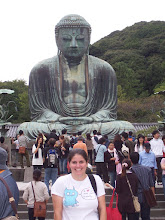Japan has a ritual for everything. A major element of Japanese culture is the belief that to do a thing well is to do it exactly the way the masters have done it for thousands of years - no variation.

This weekend, quite by accident, we observed one of those rituals in action.
While visiting Engakuji Temple we saw a group practicing Kyudo, the ancient Japanese art of archery. There are two kinds of Kyudo, contemplative and competitive. Since we were in a Zen temple I'm pretty sure they were practicing the contemplative kind.
The archers flowed into place, lifted their bows in a complex series of gestures, drew and released once or twice without shooting, and finally drew and shot. All of this was done in complete silence except for the hiss of the string and the thump of the arrow hitting the target.
Aside from a couple in Japan for the International Table Tennis Championships our little group were the only observers. We found ourselves barely whispering. Amy flinched every time her camera made its shutter noise. A bird off to our left didn't seem to recognize the solemnity of the occasion. He grumbled and screeched.

The archers, men and women dressed in white smocks and black pants that widened to bells at the ankles, didn't seem to notice. They flowed forward, shot, receded. I felt like I was caught in an eddy, spinning in slow circles while the arrows flew.
The bows were as tall as the people and top heavy. The arrow crossed the bow at only one third of it's length instead of across the middle like in Western archery.
After each shot a woman stepped out of the building they were shooting from, slipped on a pair of shoes and walked to the end of the range to collect the arrows. While she did this the archers flowed away and others took their places.
After a couple of cycles, we left our benches and went to explore the rest of the temple.
If you want to know more about Kyudo click on the purple link near the top of this page.
I leave you today with a quote from the Buddha, "As a fletcher whittles and makes straight his arrows, so the master directs his straying thoughts."



